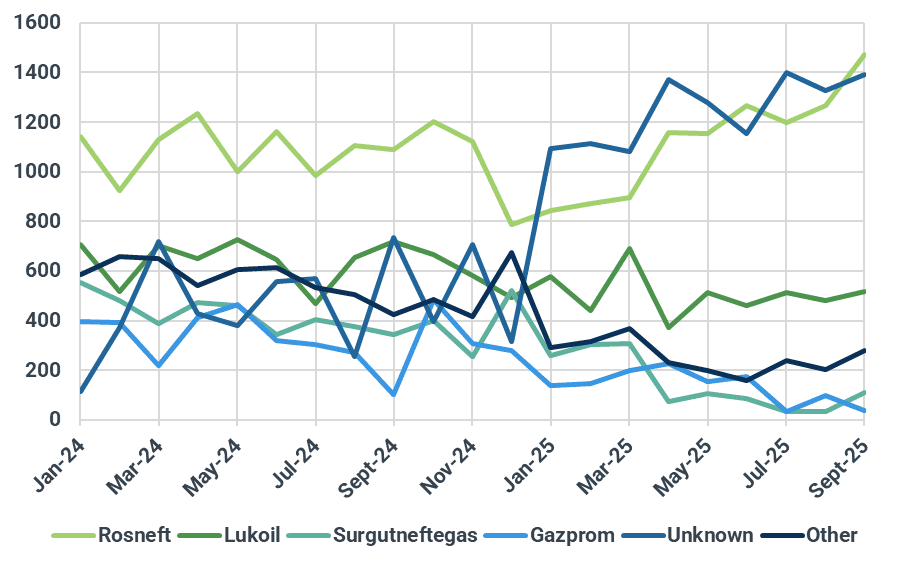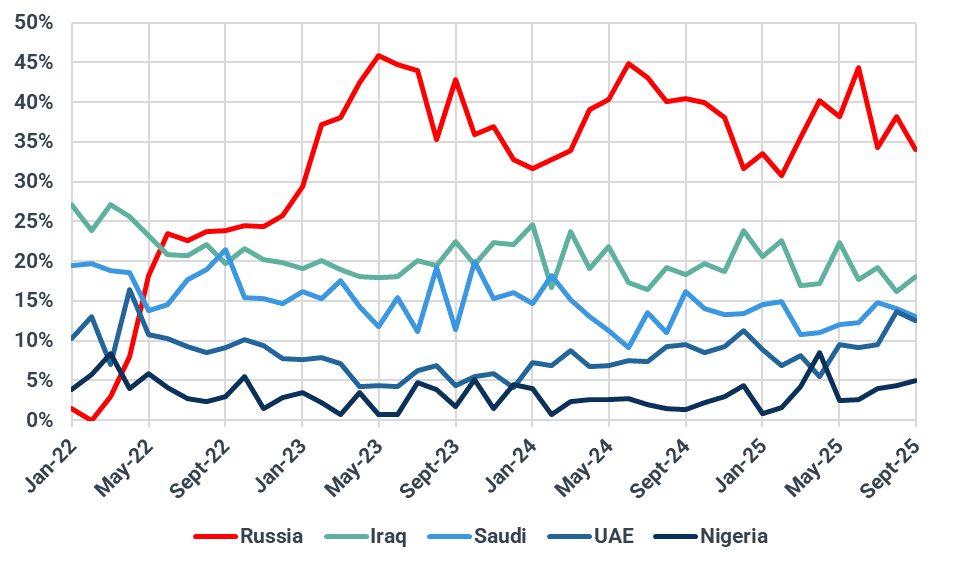US sanctions on Rosneft and Lukoil to cause short-term disruptions, not structural change
Washington’s sanctions on Rosneft and Lukoil are expected to have some short-term implications for Russia’s crude exports, as buyers reassess their risk tolerance and the potential need to reorganise trading networks. Concerns provide strong support to oil prices that have been weighed down by oversupply concerns in recent weeks.
Key takeaways:
- Sanctions on Rosneft and Lukoil, which together account for over 50% of Russia’s oil output and seaborne exports, are expected to trigger short-term hiccups as buyers reassess their risk tolerance.
- However, a major disruption to Russian crude exports appears unlikely, as the imposed measures are not secondary sanctions. Purchases by non-US entities — such as Indian, Turkish, or Chinese refiners — directly from Rosneft remain legally permissible.
- Nonetheless, Russian oil buyers are expected to reduce their buying of Russian crude and snap up prompt spot cargoes in the short-term as sanctions reduce their short-term risk appetite.
The U.S. government on Wednesday imposed sanctions on Russia’s top two oil producers and exporters, Rosneft and Lukoil — the first Ukraine-related sanctions targeting Russian energy entities in Trump’s second presidential term — amid growing frustration with President Vladimir Putin over the ongoing war.
The two companies combined produce more than 5 mbd of crude oil and condensate, contributing at least 2 mbd to Russia’s seaborne crude exports, which include grades such as Urals, ESPO, Sokol, CPC Blend, and Varandey.
With Russia’s third- and fourth-largest oil producers, Gazprom Neft and Surgutneftegaz, having been sanctioned by former U.S. President Joe Biden in January, the latest round of sanctions under the Trump administration is expected to cause an immediate, short-term hiatus in Russian crude exports, as it will take time for sellers to reorganize and rebuild their trading systems to circumvent restrictions and ease buyers’ concerns. Kpler data show that Gazprom Neft and Surgutneftegaz have significantly reduced their crude exports since Q2, suggesting that the two firms may have redirected part of their output to the domestic market and/or channelled sales through other trading firms not subject to sanctions.
Seaborne Russian crude/co exports by seller, kbd

Source: Kpler
Considering the persistent Ukrainian drone attacks on Russian refineries, Kpler estimates Russia’s crude throughput to remain around 5.2 mbd in November–December, well below the 5.4–5.6 mbd level seen during the same period last year. That said, the sanctions on Rosneft and Lukoil could prompt the producers to park some barrels in storage — either onshore or floating — and potentially trim output if no quick solution for new export channels emerges. Current Russian crude floating storage stands at around 4.2 mb, compared with nearly 7.7 mb in mid-April.
The U.S. sanctions came just days after the U.K. added Rosneft and Lukoil — alongside China’s Yulong Petrochemical and India’s Nayara Energy — to its blacklist last week. Since then, China’s state-owned refiners have reportedly halted Russian crude purchases, while Indian refiners appear to have continued trading. Chinese and Indian firms generally take a cautious approach toward U.S. sanctions, wary of potential secondary implications, although the OFAC statement did not explicitly specify any secondary measures.
That said, the U.S. measures announced on Wednesday are also expected to reduce India’s buying in the short-term. Media reports on Thursday said Indian refiners are reviewing the bills of lading for Russian oil cargoes arriving after the wind-down period ends on November 21. At the same time, refiners in India, China, and Türkiye are expected to conduct internal risk assessments on dealings with the sanctioned Russian firms while waiting for clarifications from their governments, as the decision on whether to continue taking Russian barrels could extend beyond purely economic considerations. That could lead to barrels missing the deadline lingering on the water or being resold — at steep discounts — to refiners willing to take the risk, such as already-sanctioned entities or Chinese teapots.
Share of key suppliers in India's total crude/co imports, %

Source: Kpler
Companies under term contracts with the sanctioned Russian producers — such as Reliance and PetroChina — will reduce buying activity of barrels supplied by Rosneft and Lukoil in the short-term, but are likely to resume heavy buying once the supply chain is rearranged. Refiners in China and India would scramble for prompt cargoes to fill the supply gap left by reduced Russian flows. Middle Eastern crudes such as Basrah Medium (still trading for November-loading), Abu Dhabi’s Upper Zakum, and Qatar’s Al-Shaheen are expected to attract strong buying interest, given their similar quality to Urals, relatively short voyage, and lower prices this month. At the same time, the near-flat Brent–Dubai EFS and the softened Brent structure are likely to encourage Chinese and Indian refiners to step up purchases of long-haul cargoes from the Atlantic Basin.
Short-term reductions may lead to crude inventory drawdowns in both countries, along with potential refinery run adjustments in the coming weeks. Still, as China and India together import around 2.7–2.8 mbd of seaborne Russian crude, a swift and complete replacement remains highly unlikely, also due to geopolitical reasons. That’s especially true for PetroChina’s refineries in northeastern and northwestern China, which mainly rely on domestic oilfield supply and Russian crude delivered through the cross-border pipelines (~800 kbd), should term contracts fail to proceed. However, given Beijing’s prioritization of energy security, the likelihood of PetroChina halting pipeline imports of Russian oil remains very low, especially after the recent sanctioning of the Rizhao port by the US. Still, the issue is expected to feature prominently in the anticipated Trump–Xi meeting, alongside the latest round of U.S. sanctions on several Chinese port terminals and refineries.
Market insights you can trust
Kpler delivers unbiased, expert-driven intelligence that helps you stay ahead of supply, demand, and market shifts.
Trade smarter. Request access to Kpler today.

See why the most successful traders and shipping experts use Kpler











